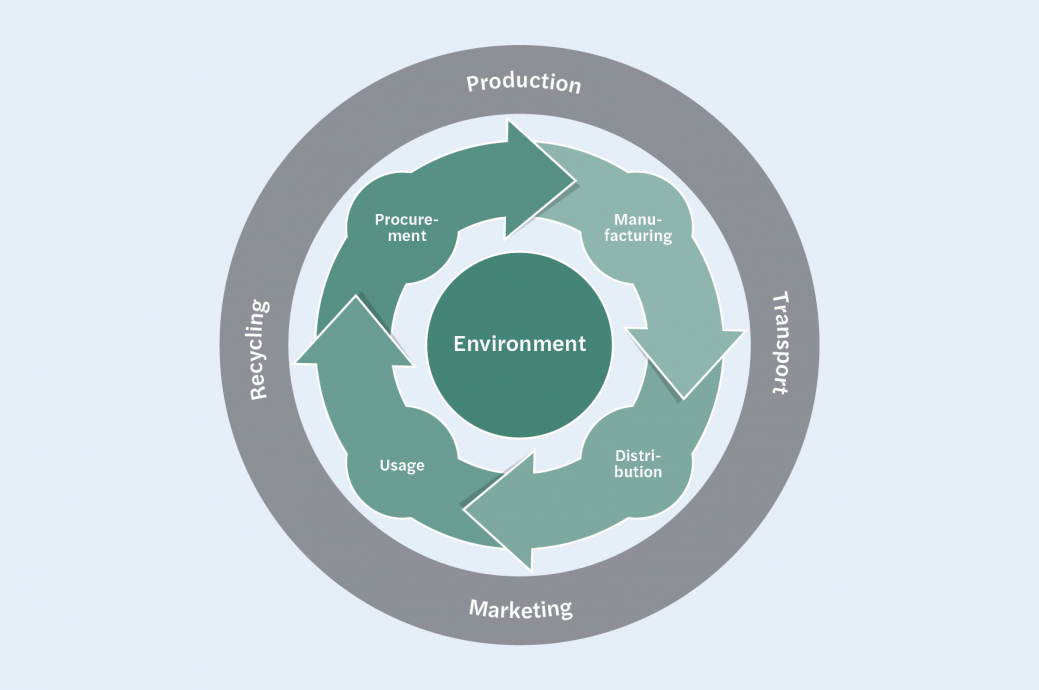
Higher expectations: sustainable supply chain management is a must-have
Why you might need to take urgent action
From purchasing to manufacturing and distribution to the use of products: large companies are now subject to new legal conditions designed to ensure sustainability throughout their supply chain. The focus of attention is on managing the ecological, social, and economic effects as well as responsible corporate leadership throughout the entire life cycle of products and services. The aim is to ensure sustainability in the corporate process across the core areas of production, transport, marketing, and recycling. Whether the Corporate Social Responsibility (CSR) Directive or the European Supply Chain Act, which will soon replace the German Supply Chain Act (LkSG), it is essential to meet many requirements. The movement is away from being reactive toward a more proactive stance that involves being a market participant that is controlling and decisive. In this respect, your company should go beyond the specific requirements and proactively position itself in the market, thereby demonstrating its clear understanding of values associated with the social obligation. This will be an important competitive advantage with regard to your investors and customers, and also boost your attractiveness as an employer ("war for talent").
What are the benefits of the new regulations?
Having a sustainable supply chain minimises your business risks, such as operational disruptions caused by negative social, economic, or environmental impacts and the resulting potential harm to your company’s reputation. By reducing resource costs and increasing labour productivity, you can also increase efficiency throughout your supply chain. Sustainable production up to the point of delivery not only meets the demands of stakeholders and customers but also prepares your company for the future in a market that is constantly evolving.
What impact will this have on your operations and organisation?
German companies and companies with a branch office in Germany are currently enforcing compliance with human rights as well as labour, social and environmental standards in their supply chains voluntarily. As a result, few companies have taken a detailed look at the sustainable conditions of comprehensive supply chain management – especially when emerging and developing countries play a role in their supply chain. However, the new legal requirements of specifically aimed at the production and marketing of sustainable products, along with increasing social pressure, including the customer's desire for suitable offerings, will soon make it necessary for companies to:
- More closely monitor their own supply chain, the supplier’s supply chain, as well as any other suppliers involved in the supply chain
- Integrate potential human rights violations, and violations of labour standards and environmental protection standards, into the risk management system
- Expand and further define the compliance management system
- Reconsider and possibly terminate the business relationship with a particular supplier if, despite efforts to raise awareness, provide clearly articulated expectations, and conduct ongoing checks, the supplier does not comply
How does your business benefit?
In addition to the new commitments, this development has many positive effects that can greatly benefit your company:
- The company’s reputation is enhanced among stakeholders, investors, employees, customers, and the general public.
- Sanctions can be avoided if there is compliance with the principles and legislation.
- Suppliers, customers, and job applicants are more likely to choose a company if it embraces sustainability.
- Optimising the supply chain ensures that a company is resilient and well-equipped to meet any future challenges (for example, in the case of a digital supply chain).
- A sustained increase in the supply chain’s efficiency can be achieved by lowering the cost of resources and optimising labour productivity.
How Mazars can assist you:
Our experts will be happy to help you to gain a comprehensive understanding of the environmental and social impacts of your own products, services, and distribution channels. We assist you in defining those elements in your value chain where there is the greatest potential for environmental and social improvements and then help you implement the appropriate measures. Doing this makes it easier to achieve greater legal certainty and an enhanced reputation.






